College of Human Sciences
Integrating ancient remedies in modern healing
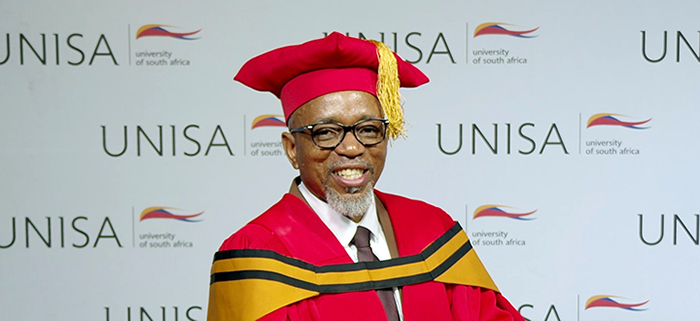
Prof David Mphuthi
In an inspiring inaugural lecture, Prof David Mphuthi, of the Department of Health Sciences in the College of Human Sciences, shared the remarkable journey that led him to integrate ancient healing practices with modern medical approaches. Titled From Ground Zero to the Skies: Reflections on My Journey Integrating Ancient Remedies to Modern Healing, his lecture explored the profound lessons he has learned throughout his academic career, his research interests and the invaluable wisdom he hopes to impart to future generations.
Perseverance and the importance of family support
Reflecting on his academic journey, Mphuthi emphasised the importance of staying focused on one's goals. "It is crucial not to shift your focus, or you will never reach your target," he explained. His journey, while challenging, taught him to trust his inner voice and embrace his unique path. He also highlighted the delicate balance between academic life and personal responsibilities. As a student and a professional, he learned that family support is indispensable, even when balancing the rigorous demands of academic life. "Never ignore your family and loved ones, as their support will always keep you going," Mphuthi advised.
Blending traditional wisdom with modern science
Mphuthi’s research interests span several vital areas, including nursing, health services management, indigenous knowledge systems in healing, men's health and nephrology. His academic curiosity stems from a deep desire to understand how indigenous communities cared for the sick before Western science took root. A particular focus has been on the potential adverse effects of popular indigenous medicinal plants on kidney health, a topic he is keen to explore further.
His interest in health services management also stems from an outcry in the public sector, where many are calling for improved healthcare delivery. Mphuthi is determined to bridge the gap between traditional and modern practices, combining the strengths of both to enhance the quality of care for diverse communities.
Guiding and mentoring future scholars
Regarding supervision, Mphuthi shared his philosophy that a supervisor should be a mentor, guide and coach, rather than a figure of authority who imposes their experiences on students. "Supervision should not be a form of revenge, but rather a lifelong mentorship," he remarked. Supervisors must help students thrive in their academic and personal growth. In this light, Mphuthi views the mentorship relationship as a two-way street, where both the supervisor and the student learn from one another.
Over the course of his career, Mphuthi has supervised 8 doctoral and 12 master’s students to completion, with more than 27 students currently under his mentorship. He expressed pride in the achievements of his students, reinforcing the critical role of supportive supervision in academic success.
Passion, dedication and student-centred learning
When asked what inspired him to enter the teaching profession, Mphuthi spoke of his deep love for imparting knowledge. For him, teaching is not merely a profession, but a passion; a way to make a difference in the lives of his students. The challenge of teaching, especially in higher education, is balanced by the fulfilment he feels when witnessing the success of his students.
Looking forward, Mphuthi advocates for a more student-centred approach in teaching. He believes that higher education should place greater emphasis on nurturing student potential, rather than focusing solely on content delivery.
Bridging academia and society
Prof Mphuthi’s commitment to community engagement (CE) is a central aspect of his academic philosophy. He leads two key community engagement projects that foster dialogue between academia and local communities. Through these projects, he aims to ensure that university curricula remain relevant to the needs of society, while also recognising the wisdom embedded in unwritten, indigenous knowledge.
"CE makes academia aware that not all knowledge is book-based. There is much wisdom in the communities that is often overlooked," he explained. By engaging with communities, Mphuthi believes academics can better understand and address real-world issues, while also contributing to the enrichment of local knowledge systems.
Broadening the scope of knowledge
International collaboration is another area where Mphuthi has made strides. He has established research partnerships with students and colleagues from various African countries, including Uganda, Kenya, Lesotho and Tanzania. Although these collaborations are still in their early stages, Mphuthi is excited about the potential to further these relationships and conduct research that transcends national boundaries.
Reflections on his inaugural lecture
Prof Mphuthi’s inaugural lecture, titled From Ground Zero to the Skies", was a reflection on his personal and professional journey in integrating ancient healing methods with modern medical practices. He explained that understanding the traditional ways in which indigenous people cared for the sick is crucial to improving modern healthcare systems. The ability to blend ancient remedies with modern science could have a profound impact on contemporary healing practices, particularly in the context of diseases that affect numerous communities worldwide.
A vision for the future
At this stage in his career, Mphuthi is focused on shaping the next generation of healthcare professionals who recognise that healing extends beyond physical treatment. Healing, according to Mphuthi, is a spiritual journey that involves the patient’s family, community, environment, and even the cosmos.
His legacy, he hopes, will inspire others to embrace a holistic view of healing, where mental, spiritual and emotional well-being are seen as equally important as physical health. "The past is not a place for residence, but a place for reference; therefore, do not stay in your past but refer and stay in your present and focus on your future," he concluded, leaving a powerful message for all who listened to his lecture.
Mphuthi’s inaugural lecture was not just a reflection on his career, but a call to action for future generations of scholars, healers and students. His work bridges the gap between traditional healing practices and modern medicine, offering a unique perspective on the future of healthcare. His legacy will undoubtedly inspire countless individuals to view healing through a more holistic lens and encourage academic practices that remain rooted in community engagement and mentorship.
* By Khabo Maduna, Communication and Marketing Specialist, College of Human Sciences
Publish date: 2025-10-03 00:00:00.0


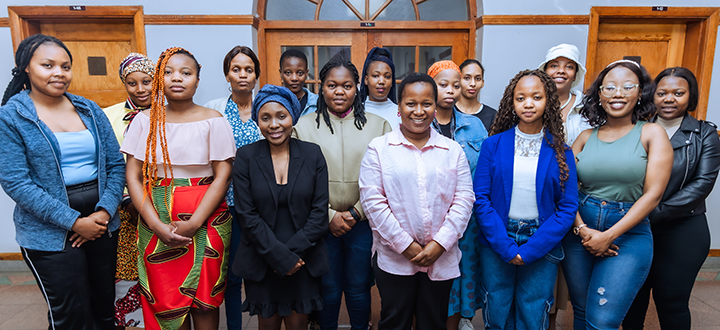 Second cohort of the Bosadi Artisan Creative Media Business Start-up Programme launched
Second cohort of the Bosadi Artisan Creative Media Business Start-up Programme launched
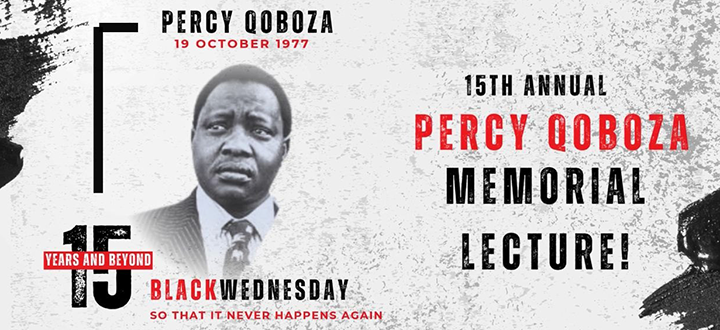 Percy Qoboza remains a luminary voice for truth and justice in the digital era
Percy Qoboza remains a luminary voice for truth and justice in the digital era
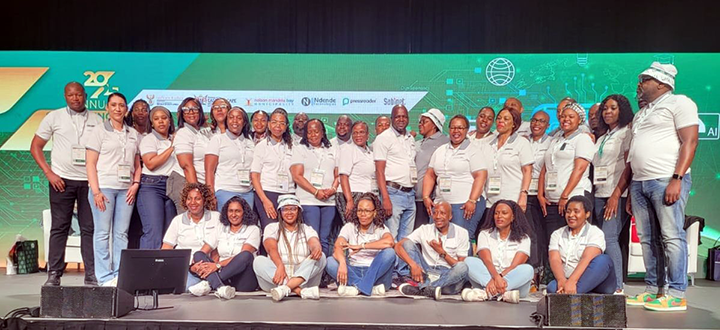 Unisa celebrates excellence at LIASA Conference
Unisa celebrates excellence at LIASA Conference
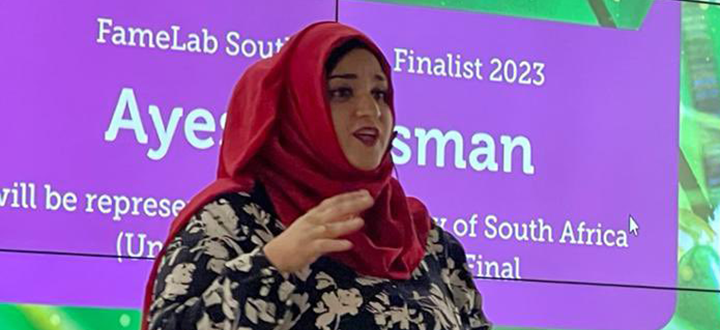 From personal struggles to national reach
From personal struggles to national reach
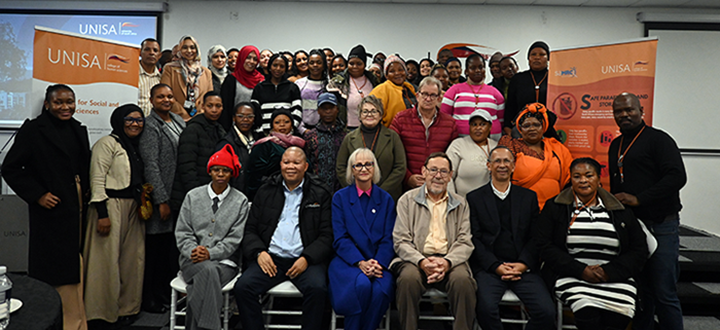 Why South Africans need safer energy alternatives
Why South Africans need safer energy alternatives